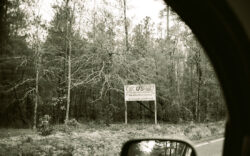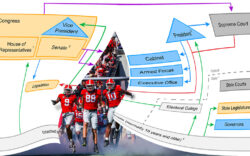We have lost our Faulkner—our garrulous, curious, peripatetic, witty, caring Milton Leathers, whose words and insights are collected not in books but in a thousand conversations reverberating in our minds, in our collective consciousness, from all strata of our community, through which he moved as a kinsman who welcomed us to his family.
He was seemingly related to all of Athens, always bringing tales of what an aunt said to her third cousin once removed, his mother’s granddaughter’s godchild. He was filled with so much family lore that it spilled over into his stories and historic sketches. He was so infinitely Southern that in order to tell you he ran by the store to pick up coffee, he might have to explain something like how his aunt had preferred that brand and how difficult it was to find it during the war, when her son-in-law whose nephew knew a wholesaler would bring it over to her from Atlanta—or some such.
But the thing about Milton was that no matter how full of his own tales he was and how eager to spin them out for our amusement and edification, he was intensely interested in our own stories and delighted in the details, remembering them and bringing them up from time to time in other conversations. And of course an integral part of Milton was his beloved Kammy and their far-flung, handsome family.
Milton caught on early to William Faulkner’s grasp that, to the old, “the past is not a diminishing road but, instead, a huge meadow which no winter ever quite touches,” and there Milton’s mind roamed, communing with those who have gone before, introducing them to us as he introduced us to each other. And Milton brought us history with his stories, because so much local history was made by his family, and he sparked the past to life, kept it from being past.
Given who he was and who he came from, Milton had the bona fides to be as exclusive as he chose. Instead, he was thoroughly inclusive, a part of all that he had met, delighting in the infinity of personalities he encountered, wanting to know everybody’s stories, connecting yours with mine, which reminded him of his, and gladly elucidating the ties that, if they don’t make us kin, at least make us kindred, related if not by blood or marriage at least by shared experience, transmogrified by his wide reach into that commonality of experience that makes us all citizens of Milton’s community of souls and of the Athens he spread before us and showed us how it is our town, how we belong together.
And so we remain. Although he has slipped away, he has left us a vast inheritance that we must all continue to share, investing it in each other so that time will not diminish but will enhance Milton’s wonderful gifts of the spirit, so that he will live forever in our hearts.
Faulkner’s early poem quoted by Joseph Blotner at the conclusion of his masterful Faulkner biography provides a summation that applies aptly to our own beloved bard:
If there be grief, then let it be but rain,
And this but silver grief for grieving’s sake,
If these green woods be dreaming here to wake
Within my heart, if I should rouse again.
But I shall sleep, for where is any death
While in these blue hills slumbrous overhead
I’m rooted like a tree? Though I be dead,
This earth that holds me fast will find me breath.
Graveside services will be held at Oconee Hill Cemetery on Friday, Dec. 3 at 12 p.m. A reception follows at The Hill (1800 Crescent Lane).
Like what you just read? Support Flagpole by making a donation today. Every dollar you give helps fund our ongoing mission to provide Athens with quality, independent journalism.










